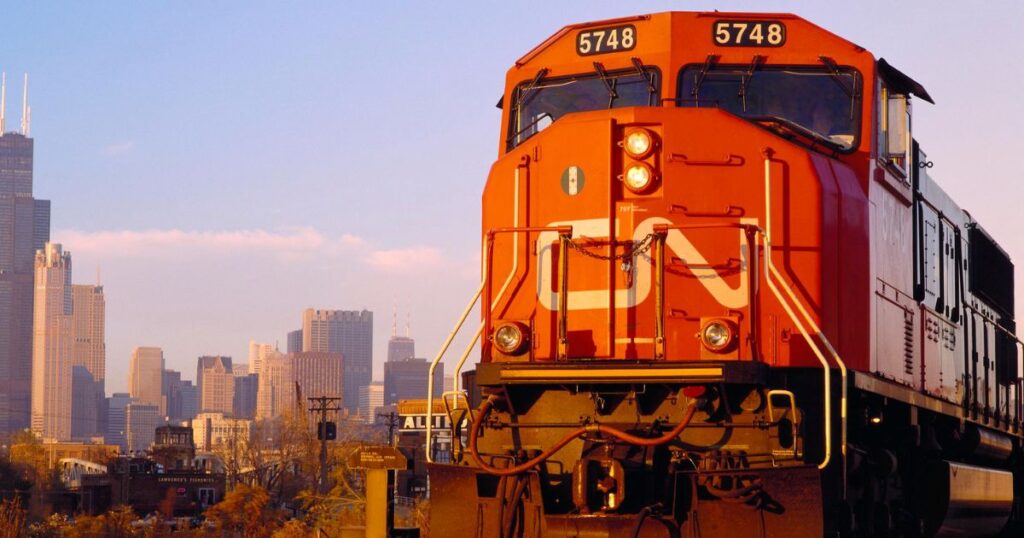This article is included in these additional categories:
Two of Canada’s largest rail companies, Canadian National Railway (CN) and Canadian Pacific Kansas City (CPKC), are preparing for a nationwide work stoppage set for August 22, 2024. Both companies have issued lockout notices to the Teamsters Canada Rail Conference (TCRC), representing over 9,000 employees. Despite ongoing negotiations, the parties remain deeply divided, threatening a shutdown of Canada’s critical rail network. This could significantly impact industries across North America, affecting the transportation of essential goods like grain, chemicals, and fertilizers.
A Breakdown in Negotiations
The labor impasse began earlier this year when CN made multiple attempts to negotiate a new collective agreement with the TCRC. CN proposed a deal to enhance wages, work-life balance, and safety protocols, but the union rejected it. Several revised proposals, including wages of $75 per hour for locomotive engineers and $65 per hour for conductors, were also declined. After failing to reach an agreement, CN proposed binding arbitration, which the TCRC also rejected.
Amid the impasse, CN has started a phased and progressive shutdown of its network to ensure safety, with additional embargoes on shipments. CPKC has similarly prepared for a potential lockout, issuing notices to its employees and imposing embargoes on hazardous materials. Industries reliant on rail freight are scrambling to mitigate the potential fallout from a prolonged disruption.
Economic Fallout and Supply Chain Disruptions
The impending work stoppage could significantly disrupt the Canadian economy, which relies heavily on rail transport to move goods. CN and CPKC collectively transport over $732 million in products daily. According to the Business Council of Canada, the shutdown’s impact could extend beyond the immediate value of goods, potentially resulting in billions of dollars in lost revenue, wages, and international contracts.
Fertilizer manufacturers like Nutrien Ltd., reliant on rail to transport products to farmers, have begun implementing contingency plans to safeguard supply chains. Fertilizer Canada has expressed concerns about food security if rail transport halts, as 75% of fertilizer in Canada moves by train. Alternatives like trucking are limited and costly, creating challenges for companies.
Canada’s grain industry also faces the prospect of a near-total shutdown if the rail stoppage occurs. Over 90% of Canadian grain moves by rail, which could halt agricultural exports. Grain exporters risk demurrage fees, contract penalties, or sales defaults due to the inability to fulfill international orders.
The chemicals industry is also at risk, as many products require specialized rail transport for safety reasons. Industrial chemicals constitute about 10% of Class 1 freight traffic in Canada, valued at $55 million daily. As CN and CPKC halt new shipments of hazardous chemicals, the industry braces for significant disruptions. Bob Masterson, CEO of the Chemistry Industry Association of Canada, warned of an impending supply chain crisis.
Wider Implications
The ramifications of a work stoppage extend beyond Canada’s borders. CN and CPKC operate cross-border routes into the United States, meaning the shutdown would affect North America. Industries dependent on Canadian railroads are exploring alternative routes through U.S. ports, but this is far from ideal. Rail freight holds the equivalent of 300 truckloads of goods, and shifting to road transport could spike trucking rates by up to 20%, according to transport industry experts.
The economic risks of a protracted labor dispute have prompted increasing concern among Canadian businesses and international trade partners. Canada’s global reputation as a reliable trading partner is at stake. If the rail network proves unreliable, customers and trading partners may adjust their sourcing strategies, exacerbating Canada’s economic vulnerabilities.
A Path Forward?
CN and CPKC have expressed a commitment to continuing negotiations in good faith. However, without an agreement or acceptance of binding arbitration, both companies seem poised to lock out their workers on August 22. This move, intended to protect supply chains, carries significant risks and challenges. Industries are left in a precarious position, preparing for the worst while hoping for a last-minute resolution.
Original Story at www.environmentenergyleader.com
